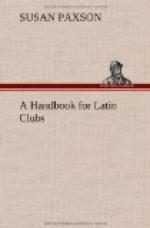Nec me meminisse pigebit Elissam
Dum memor ipse mihi, dum spiritus hos
regit artus....
Or, with more definite and sublime grandeur, the vast forms of Roman statesmanship appear: “Today, Romans, you behold the commonwealth, the lives of you all, estates, fortunes, wives and children, and the seat of this most renowned empire, this most fortunate and beautiful city, preserved and restored to you by the distinguished love of the immortal gods, and by my toils, counsels, and dangers.”
What great thoughts were found within these pages, what a Roman vigor was in these maxims! “It is Roman to do and suffer bravely.” “It is sweet and glorious to die for one’s country.” “He that gives himself up to pleasure, is not worthy the name of a man."...
There was nothing harsh or stern in this book, no cynicism, no indifference; but it was a flower-garden of lovely out-door allusions, a gallery of great deeds; and as I have said before, it formed the child’s first real glimpse into the kingdom of words.
I was once asked by a doctor of divinity, who was also the overseer of a college, whether I ever knew any one to look back with pleasure upon his early studies in Latin and Greek. It was like being asked if one looked back with pleasure on summer mornings and evenings. No doubt those languages, like all others, have fared hard at the hands of pedants; and there are active boys who hate all study, and others who love the natural sciences alone. Indeed, it is a hasty assumption, that the majority of boys hate Latin and Greek. I find that most college graduates, at least, retain some relish for the memory of such studies, even if they have utterly lost the power to masticate or digest them. “Though they speak no Greek, they love the sound on’t.” Many a respectable citizen still loves to look at his Horace or Virgil on the shelf where it has stood undisturbed for a dozen years; he looks, and thinks that he too lived in Arcadia.... The books link him with culture, and universities, and the traditions of great scholars.
On some stormy Sunday, he thinks, he will take them down. At length he tries it; he handles the volume awkwardly, as he does his infant; but it is something to be able to say that neither book nor baby has been actually dropped. He likes to know that there is a tie between him and each of these possessions, though he is willing, it must be owned, to leave the daily care of each in more familiar hands....
I must honestly say that much of the modern outcry against classical studies seems to me to be (as in the case of good Dr. Jacob Bigelow) a frank hostility to literature itself, as the supposed rival of science; or a willingness (as in Professor Atkinson’s case) to tolerate modern literature, while discouraging the study of the ancient. Both seem to commit the error of drawing their examples of abuse from England, and applying their warnings to America.... Because the House of Commons was once said to care more for a false quantity in Latin verse than in English morals, shall we visit equal indignation on a House of Representatives that had to send for a classical dictionary to find out who Thersites was?...




